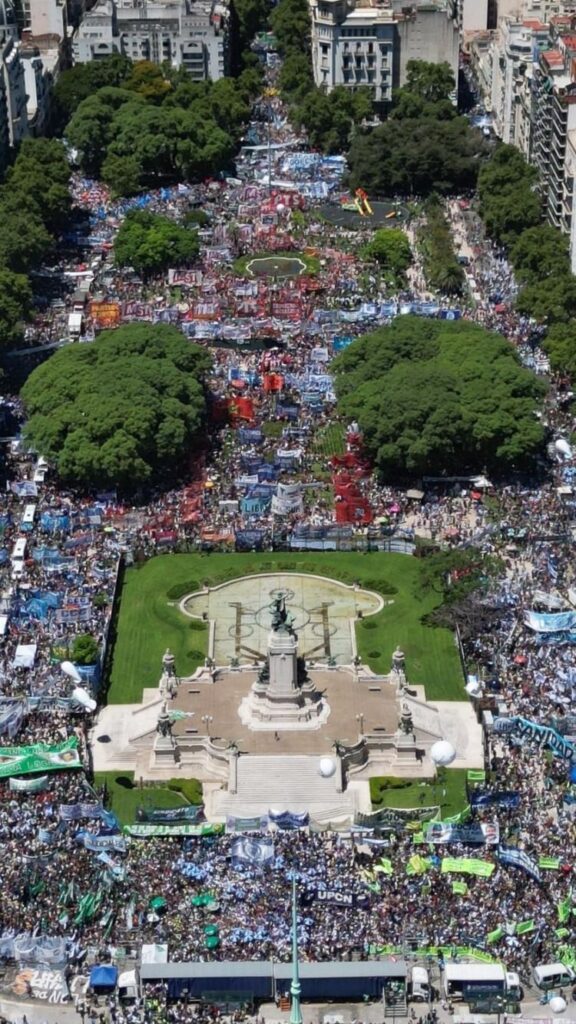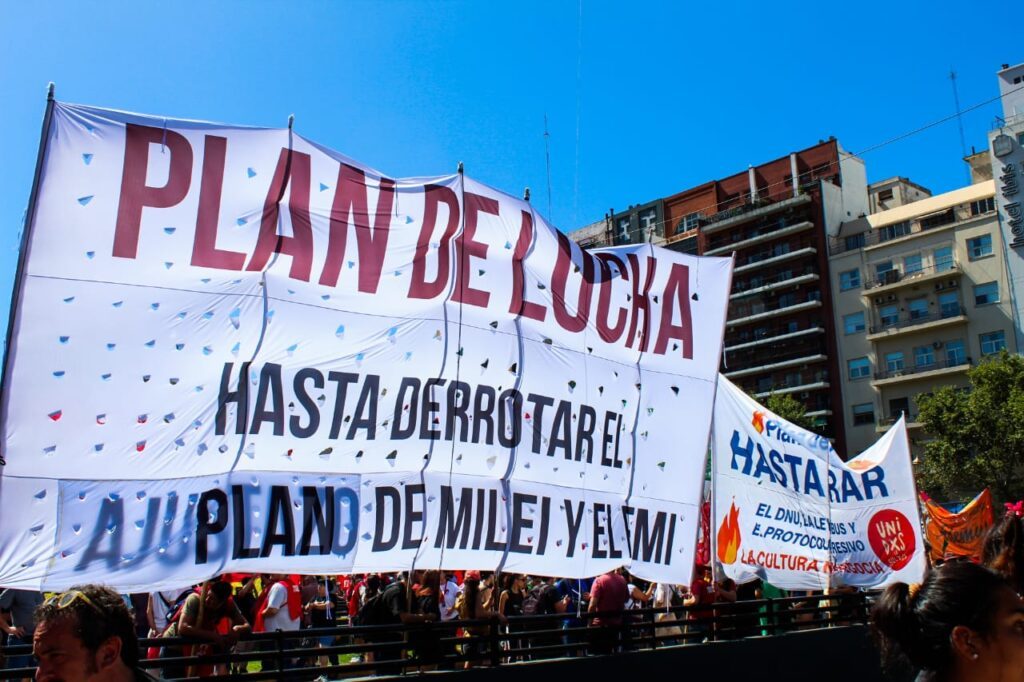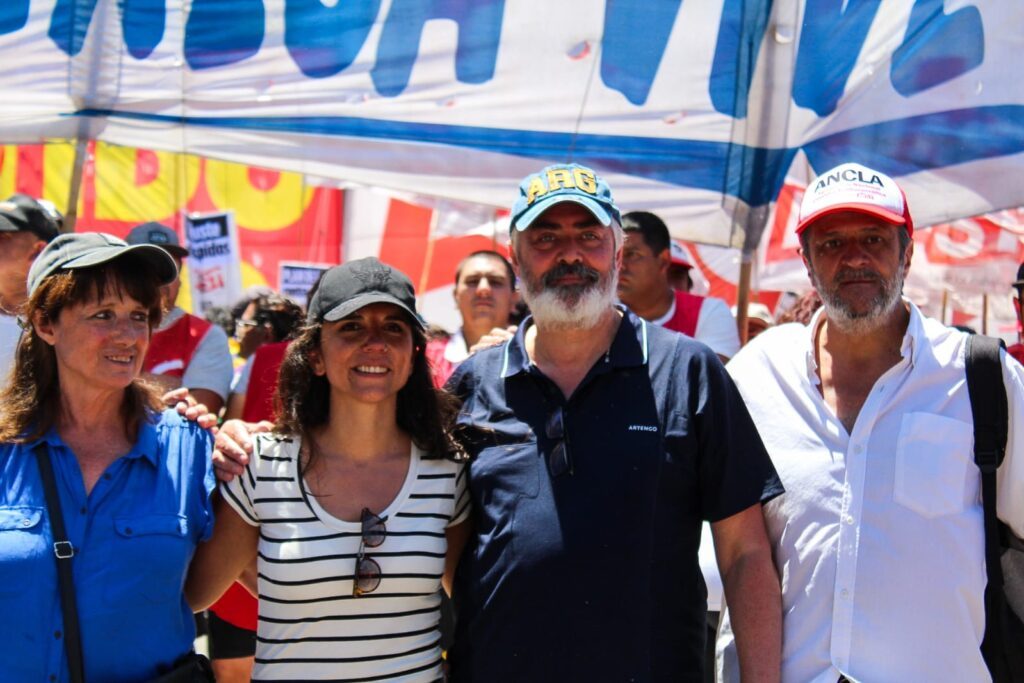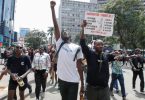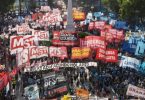By Sergio García
On 24th January, A huge mobilization of hundreds of thousands of workers and social organizations of the unemployed, the cultural sector, neighborhood assemblies and the youth held at Congress to denounce President Milei’s mega Necessary and Urgent Decree (DNU) and Omnibus Law and Security Minister Bullrich’s anti protest protocol. The crowd not only filled the Plaza and its flanking streets, Rivadavia and Irigoyen, but thousands of others also occupied the entire Avenida de Mayo up to 9 de Julio (8 blocks of a wide avenue), making it unable to enter the Plaza because it was already packed, as it is evident in all the images and videos. The huge amount of mobilized people took over the streets, the same streets that the repressive Bullrich and her unconstitutional protocol want to forbid us from using. Today was a bad day for that despicable minister, not only because of the multitude mobilized in front of Congress, but also because at the same time significant mobilizations held in each province all over the country.
Although the call for the mobilization to Congress was made by the CGT,1 it was taken and used as an action of struggle by various significant sectors: all the cultural organizations, which comprises one of the sectors that are mobilized and organized against the government, the columns of neighborhood assemblies of Buenos Aires City, Greater Buenos Aires and La Plata, all the social and piquetero organizations, and many student centers, among other mobilized sectors, as expected.
There was a strong presence of the left as well, including a significant column of the MST in the FIT Unity and of the Teresa Vive Movement (MST led social movement), which was part of a large multisectoral and independent column with a strong protagonism and a huge banner demanding a plan of struggle until the DNU and the Omnibus Law are overturned. This column gained an important place in the Plaza Congreso early in the morning.
Everything led to the fact that, although the CGT was the central convener and, obviously, many unions were present, the social movements and the left’s political organizations and labor unions occupied an important part of the Plaza. This demonstrated two facts at the same time. On the one hand, the significant weight of the social organizations and the left was evident. On the other hand, the unions led by the CGT, although they carried out the strike and an important mobilization, with some unions even not managing to enter the Plaza, the truth is that the confederation could have mobilized much more than they did. As always, the trade union bureaucracy, even when it calls for an important action like today’s, constricts the strength of the organized labor movement, in order to avoid being overpowered or receiving criticisms upon the leadership from below.
As the first conclusion of today’s events, it is evident that it was a very important action of struggle that strengthened the workers’ movement and all sectors in struggle, considering the mobilization and also the hours of strike. The fact that there were many thousands of us in Congress Plaza and throughout the country is a serious blow to Milei’s government and to his entire project and shows the enormous strength that the working class has when it breaks out and fights. That strength could be expressed ever stronger if it had a militant and democratic leadership, in accordance with the needs of the tough struggle ahead of us.
The CGT’s plan of struggle?
In the context of the strike and mobilization that invigorates the entire movement against Milei’s plan of austerity and repression, the speeches by the CGT leaders were evidently far from what is needed. Because at this very moment the government is struggling to achieve a session to debate the Omnibus Law and today was more than the right moment to determine the concrete measures of a plan of struggle.
The central rally began after 2:00 pm with the reading of a document agreed and signed by the CGT, the two CTA’s,2 the UTEP3 and various organizations related to these sectors, that raised general denunciations of the DNU and the Omnibus Law. Beyond those correct denunciations and a logical call to defend all workers’ gains, the document was focused on appealing to Congress members in view of the legislative body’s next session, which, in principle, would be held next week. But it did not contain any proposal to continue the struggle after the enormous demonstration of force carried out today.
Someone might think that such continuity would be announced in the following speeches given by GGT leaders Moyano (truck drivers’ union) and Daer (private health union). Not at all, neither of them made a single mention of any new measures of struggle, of staggered plans, of calls for new strikes or marches. Nothing! Staring directly at an enormous working class and massive force, they opted for general speeches, some correct denunciations, but no mention of how to continue the struggle. Only in passing did Daer say, “we will continue the struggle”. But, as is well known, struggles only actually continue with measures of force that are not isolated but part of a serious plan of struggle.
In fact, there was a first very obvious call that the CGT could have made and chose not to: to mobilize on the day that the Omnibus Law will be debated (next Tuesday) to apply pressure that day with the strength of thousands in the streets. The central speeches did not call for this or any other task, which ratifies what we have been saying: the enormous struggle that is needed against Milei cannot be left in the hands of the old bureaucracy of the CGT. We have to continue demanding that they call for new measures, because we need the entire organized labor movement in the streets. But we have to take this struggle into our own hands, as various sectors are already doing.
Our tasks
Beyond the debates that we have with the leadership of the CGT, it is clear that today’s action is driving the struggle and the desire of many thousands to strengthen the fight against the government. We have to take this very positive fact as a starting point, to advance with new tasks and actions of struggle.
On the one hand, we have to return to each workplace to assess this mobilization and this half-day strike, which were very important. To value it and to demand each union to convene meetings of delegates and rank and file assemblies to debate and decide how to continue the struggle. And where the union leadership does not want to do so, we have to organize all the activists among workers who do want to, to evaluate and debate together what measures can be carried out. We must coordinate with other working class sectors in struggle, providing support and solidarity to those who are in processes of struggle against layoffs or privatizations, or for wages.
At the same time, we have to convene assemblies in each neighborhood4 and debate in depth with all the neighbors to prepare for the coming struggle for food and increases in social assistance.
In the neighborhood assemblies5 that were also protagonists today, we have to take advantage of this momentum to strengthen them, to call more neighbors and youth to participate, to hold well prepared meetings in the coming days to assess everything, and to prepare new and bigger “cacerolazos” to make the strength of all our demands felt.
In the culture sector, which today participated massively with great strength, we have to guarantee the following measures that were decided at its last assembly, such as the festivals, the carnavalazo, the federal cultural march and the national culture assembly.
As already resolved by Unidxs por la Cultura and other sectors, we have ahead of us a very important first action: to mobilize in strength and surround Congress next Tuesday when the Omnibus Law will be debated. This debate is ongoing with complicit legislative blocks working in favor of the government, but also many contradictions and crises. The final outcome is yet to be known. Today’s massive mobilization, and also the one we can carry out that day, can help to apply pressure against them moving forward. We have to be there in strength.
From the anti-capitalist and socialist left and the FIT Unity, we have the political responsibility to strengthen the multisectoral and independent space, which, after overcoming strong debates and disagreements, ended up building a positive unitary column and was a protagonist of the event. It is necessary to strengthen and give continuity to this coordination of the political left, class based unionism, human rights organizations, culture organizations, assemblies and social movements and piqueteros. No struggle can be won without uniting this entire political and social force. On the one hand, this unity is essential to much more thoroughly push forward the fights to come. And on the political level, it is essential to insist on the need to strengthen a new political alternative from and together with the left.
Courtesy International Socialist League

